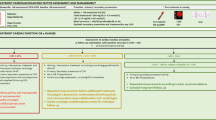Abstract
Purpose: Correlation between aging and doxorubicin-induced congestive heart failure in patients with metastatic breast cancer was studied to determine whether doxorubicin-induced congestive heart failure in elderly patients with metastatic breast cancer is a clinically significant issue. Methods: This was a retrospective study with a median follow-up of 16.8 years. The setting was a comprehensive cancer center in a large city. A group of 682 consecutive patients with metastatic breast cancer presented to The University of Texas M.D. Anderson Cancer Center between 1973 and 1980. All patients received doxorubicin by bolus infusion. Patients in group 1 (n = 538) were aged 50 to 64 years; patients in group 2 (n = 144) were aged 65 years and older. Medical records of all patients were reviewed. Patients who had congestive heart failure were identified and analyzed. The diagnosis of doxorubicin-induced congestive heart failure was made and confirmed by a cardiologist at the time of its development. The main outcome measure was the cumulative probability of developing doxorubicin-induced congestive heart failure in elderly patients with metastatic breast cancer compared to a younger age group. Results: In group 1, 33 patients, and in group 2, 13 patients developed doxorubicin-related congestive heart failure. The cumulative doses of doxorubicin administered to patients with congestive heart failure were 410 mg/m2 (range 150–550 mg/m2) and 400 (range 100–570 mg/m2), respectively. The time interval from the last date of doxorubicin treatment to the development of congestive heart failure was, respectively, 5 months (range <1–65 months) and 9 months (range <1–28 months). There was no statistically significant difference between the two congestive heart failure subgroups, nor were we able to identify risk factors that could have increased the risk of congestive heart failure among these patients. Conclusion: Older patients with metastatic breast cancer and no significant comorbidity can be treated with doxorubicin-based chemotherapy with no added risk of developing congestive heart failure beyond that in the younger age group.
Similar content being viewed by others
Author information
Authors and Affiliations
Additional information
Received: 2 June 1998 / Accepted: 6 October 1998
Rights and permissions
About this article
Cite this article
Ibrahim, N., Hortobagyi, G., Ewer, M. et al. Doxorubicin-induced congestive heart failure in elderly patients with metastatic breast cancer, with long-term follow-up: the M.D. Anderson experience. Cancer Chemother Pharmacol 43, 471–478 (1999). https://doi.org/10.1007/s002800050926
Issue Date:
DOI: https://doi.org/10.1007/s002800050926




